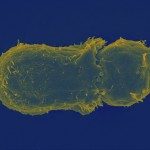Lien vers Pubmed [PMID] – 8417375
Mol. Immunol. 1993 Jan;30(1):55-67
We have generated a soluble form of the CD8 molecule consisting of the entire extracellular domains of the human alpha chain, by expressing a mutated CD8 alpha cDNA in SF9 cells infected with a recombinant baculovirus. The truncated molecule was secreted into the medium mostly as a disulfide-linked homodimer in which a single cysteine residue in the hinge-like region (Cys143) was sufficient to assure covalent bonding. Soluble CD8 purified to homogeneity appears to be monodisperse as assessed by gel filtration analysis and contains only O-linked carbohydrates. To determine whether recombinant CD8 can interact with MHC class I molecules, we developed an assay that measures binding of MHC class I-bearing cell lines to purified CD8 adsorbed to plastic plates. The level of binding of cells to immobilized CD8 depended on the amount of CD8 bound to the plate and correlated with the levels of cell surface MHC class I expression. The binding was specifically inhibited by monoclonal antibodies directed either against CD8 or MHC class I molecules. This assay therefore provides a way to measure CD8 binding to MHC class I independently of other cell-cell interactions and should allow direct structure-function studies.

